Joshua Casteel served as an interrogator in Iraq. Then an encounter with a Jihadist challenged him to truly live out his faith.
War

AS THE U.S. prepares to officially (but not completely) pull out its military from Afghanistan by the end of 2014, some wonder whether it all was a waste. More than a decade of war has cost tens of thousands of lives and hundreds of billions of dollars. But the balance sheet of “lessons learned” shows some less-depressing calculations.
In the last several years, U.S. generals have repeatedly told Congress and the U.S. public that “there is no military solution” to the war in Afghanistan. This marks a significant shift in military thinking. In the early 2000s, the boastful, overconfident views that wars in Afghanistan and Iraq would be quick and easy outnumbered more cautious and skeptical military voices. If nothing else, more military leaders today are forthrightly speaking out against the fantasy of firepower solutions to complex political problems.
The U.S. and its Western allies are also learning a related lesson: The lack of legitimate governance is a fundamental cause of much of the world’s violence. Afghanistan’s political leaders who opposed the Taliban became de facto Western allies, even though many had ruled by force and racked up their own long list of human rights abuses. In the rush to set up a new government to replace the Taliban, the West propped up corrupt and tyrannical warlords as provincial governors, dooming hopes for an Afghan democracy and authentic leaders with popular support.
Counterinsurgency projects attempted to pull support from the Taliban and other insurgents by winning Afghan hearts and minds so they would trust their government. But Western military forces learned that free handouts of Western aid money could not fundamentally change the corrupt nature of the Afghan government or its public image.

I’d say the moment is ripe for “Christ in Christmas” — the real Christ, of course, who shunned the privileged and aligned himself with sinners and outcasts, whose heart went out to sufferers like the homeless of Rome whom a new pope risks serving.
I’d say the moment is ripe for new life being born in stables and forced to flee the powerful and greedy. We have seen Mammon’s insatiable maw, power’s absolute corruption of the human soul, and thugs murdering the many in order to protect the few — and we know our need of something better.
So, yes, it’s time for Christ in Christmas. Time for new life, time for hope, time for the faithful to say yes to God. Time for peace, not war. Time for repentance, not comfort at any cost. Time for justice and mercy and the even-handed goodness that God promised.
This, of course, isn’t what zealots mean when they vow to “defend” the faith from a culture’s “war on Christmas.” They want a free-fire zone where moralizers can denounce all but the like-minded, and churches with huge budgets can frighten or seduce worshippers into donor mode. They mean using Jesus’ name to impose the very cultural and political oppression that Jesus escaped once as a child but couldn’t escape as an adult.
LATELY I’VE been reading my dead friend’s files. That’s how I know that he often typed in Cambria. That’s how I know that he drafted beginning-to-end, reworking early paragraphs before he set down the next—which is why so much of his writing just stops. That’s how I know that as a child he held press conferences in a White House made of cardboard boxes, wearing a clip-on tie, and that the night before he began school at West Point (a school he’d soon leave), he and his father smoked cigars on a hill overlooking the Hudson River, though his father did not like cigars. That’s how I know how much he thought about pain, which to Heidegger is “the rift,” a “separating that gathers,” and to Wittgenstein is “a having, not a knowing,” and to Elaine Scarry is an “objectless experience” that “destroys language.”
This thinking was for classes at the University of Iowa and the University of Chicago, and this thinking was for other people, namely prisoners and fellow soldiers in the War on Terror, which was also the Global War on Terrorism, and was the Iraq War and is still the War in Northwest Pakistan and the War in Afghanistan, a subset of which is “Operation Enduring Freedom,” and is also and continues to be World War III or World War IV, depending on how you count, and was once The War Against Al-Qaeda and is now the Overseas Contingency Operation, which has been tidily renamed CVE (Countering Violent Extremism).
Joshua Casteel was sent to the Long War after first enlisting in the Army Reserves as a high school junior in Cedar Rapids, Iowa. Seven years later he was stationed at Abu Ghraib prison as an interrogator and linguist. This is where he became convicted that he could no longer be an “American war fighter,” which he saw as treason against his “real kingdom and home.”

THIS STORY IS about the loss of a war and the sin and insanity of continuing to wage that war with the same weapon: prisons. From the well-meaning but naive “solution” of “just say no” to the equally well-meaning but equally naive mandatory minimum sentences, we have been defeated in our War on Drugs.
When we finally realized that we had lost the undeclared war in Vietnam, those remaining in Saigon climbed to the highest building and clung to the last helicopter leaving the country. Now it is time for the metaphor to be exercised in the drug war. We have lost.

IN EARLY SEPTEMBER, President Obama told the American people that the use of chemical weapons by Bashar al-Assad of Syria was a moral atrocity that required international consequences.
Religious leaders agree with the necessity of a determined response to the Assad regime, which is responsible for the deaths of 100,000 of his own people, including the brutal use of chemical weapons on civilians. But many faith leaders are asking tough moral questions about what that response should look like.
We fundamentally reject the assumption that refraining from military action is “doing nothing.” We need more imagination and a deeper response than the traditional one of military strikes, which haven’t proven effective and almost always have serious unintended consequences, risk dangerous escalations, and consistently create more suffering for innocent civilians.
As religious leaders, we are called to peacemaking, not just peace loving, which requires harder and more imaginative work than merely falling into old habits of military “solutions.” Our priorities should be to mobilize global support for the many vulnerable Syrians—including the millions of refugees—and to do the hard work of conflict resolution that could lead to a political solution.

If we're going to talk about food, we need to start with theology. Before chocolate was invented, a snake put "sinfully delicious" and "decadent" on the menu. Somebody fell for the marketing ploy, and we've had a complicated relationship with food ever since.
We've also had a complicated relationship with sex, and with siblings, and with weapons of mass destruction. It's all there in Genesis (where the WMDs are swords). And pretty soon, right-thinking people started coming up with rules to keep people from doing bad things. You can have sex with this person but not that one. You really shouldn't deceive, sell, or kill your brother. Beat your swords into plowshares.
The rules helped to restrain bad guys, and they gave would-be good guys some helpful pointers. Still, there were plenty of bad guys to go around, and good guys could get pretty anal about what other people should or shouldn't do. Anyway, it's obvious that you don't create a good marriage simply by avoiding sex with the wrong person, and you don't have a pleasant Thanksgiving dinner simply by not killing your siblings, and you don't banish war simply by wiping out as many weapons as possible. The rules are helpful — adultery, fratricide, and genocide are really bad ideas —but if you want a Peaceable Kingdom, you're going to need more than rules.
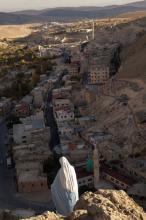
A huge statue of the Virgin Mary towers over churches, monasteries and mosques in the Syrian city of Maaloula, where a dialect of the Aramaic language of Jesus is still spoken.
The town has managed to stay out of the Syrian conflict between Sunni Muslim rebels and the regime of dictator Bashar Assad, as have most of Syria’s 2 million Christians.
But worsening violence has forced the community into a corner: Continuous clashes between the rebels and the regime in this isolated town of 2,000 people as well as other Christian towns over the past two weeks have many Christians worried that they will no longer be allowed to stay neutral.
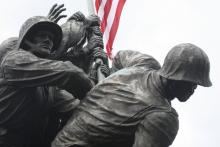
I wish that we, as a people, would speak better words to those who have served in our wars. I fear that we do them, and ourselves, a disservice when we call them all heroes without letting them decide which deeds were heroic and which should be left unspoken. When we call everyone who wears a uniform a hero, we diminish heroism everywhere.
I don’t mean we should refrain from thanking those who serve. If anything, we should thank them far more than we do, and our thanks should not just be in words. Our thanks should be sincere and long-lasting, and expressed in things like the best military hospitals we can afford, the best education we can provide, and our best efforts to ensure that their generation will be the last to endure what they have endured. Even if those ideals prove to be unattainable, we should not let that stop us from trying to attain them. As the Talmud says, “It is not your job to finish the work, but you are not free to walk away from it.”

Maybe you are like me and you need a bit of good news this week, because it’s been a week of bad news. There was the tragic shooting at the Navy Yard, leaving 12 people killed. Then there were the racist comments about the new Miss America, Nina Davuluri. She is the first person of Indian descent to be crowned Miss America, yet the news of the event emphasized racist tweets. It was almost as if people were competing over who could be the most racist: Some referred to her as “the Arab,” and other tweets claimed, “this is America, not India,” and one even called her “Miss 7-11.” Not to mention the continuing escalation of tensions throughout the world involving Syria.
It was a depressing beginning to the week. I mimetically absorbed much of this violence, hatred, and racism. Misanthropy settled into my soul and I began to loathe myself and the entire freakin’ human race.
But then I saw this video of Beyoncé performing in Brazil, and my hope in humanity was restored.
I was there with the NGO Justice for Colombia to hear about the country's 'false positives' scandal, which first broke five years ago and shows no sign of relenting any time soon. The scandal has its roots in the Colombian 50-year civil war between the government and the left-wing peasant insurgent group FARC. In the early 2000s, then-president Alvaro Uribe, out of an apparent concern for the army’s reputation, started putting pressure on soldiers to increase their kill figures.According to media reports, soldiers were promised cash payments and more vacation time if they produced the bodies of dead FARC guerrillas—an accusation the government denies. In an effort to increase their quotas, soldiers allegedly started luring young, impoverished men away from their homes with the offer of work. Once away from their families, the soldiers executed the men, dressed them up in guerrilla uniforms, and presented them as combat kills. Many victims were dismembered and buried hundreds of miles away from their families.
Read more.
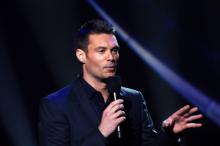
As President Barack Obama prepared to address the nation on Tuesday evening to articulate a plan for intervention in Syria, NBC rushed to assure its viewers that the Ryan Seacrest-hosted game show, The Million Second Quiz, would not be interrupted. As detailed by the network, the president would speak for only 15 minutes, thus viewers could watch their televisions with full confidence that the entirety of the hyped-up program would be fully protected. While there was suspense as to whether NBC would follow through on its promise of an unbroken telecast, the presidential coverage stayed within the agreed upon time slot, viewers were able to watch their regularly scheduled program, and all was well in the world.
In the meantime, all is not well in the world.
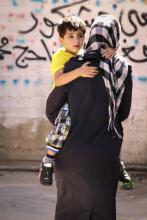
I have read countless articles from political, religious, and ethical perspectives on why or why not the U.S. should militarily intervene against the Syrian regime. Most do a decent job evaluating the situation, but I have yet to read one that really puts the human element on the table as a deciding factor.
A few months ago I was going to bed in my hotel room in Tel Aviv when I saw the breaking news alert that there was rocket exchange between Hamas and Israel in and around Gaza. While I have been to many places in "conflict," there is something much different about being somewhere that is only miles away from live fire.
I started playing out the situation in my head: "What if this expands into a major conflict? Can I catch a flight back home to be with my family before it gets worse? I'm only 30-40 miles away from the active conflict, am I already in range sitting in this hotel room?"
Anxiety. Fear. Uncertainty.
Now let me be clear, that experience of anxiety and fear is NOTHING compared to what most Israeli's, Palestinians, Egyptians, or Syrian's have felt in recent years (and MANY other populations). But — even if only in some small way — I could immediately feel the weight of pending war. It is palpable. It is crippling. And if I had my family with me, it would have potentially been unbearable.

As the Obama administration considers a strike in response to recent chemical attacks, the head of a global evangelical group said Wednesday that Christians in the Middle East oppose military intervention in Syria.
“There is major consensus amongst the Christian leaders in this region that any military intervention would have a detrimental effect … on Christians in Syria,” wrote Geoff Tunnicliffe, secretary general/CEO of World Evangelical Alliance, in a letter to the State Department, the White House and the United Nation’s Security Council.
![Pope Gregory the Great, Carlo Saraceni [Public domain], via Wikimedia Commons Pope Gregory the Great, Carlo Saraceni [Public domain], via Wikimedia Commons](https://sojo.net/files/styles/medium/public/blog/Gregorythegreat.jpg)
As I began my morning devotions on Tuesday this week, Syria was on my mind. No surprise, right? The debate about whether to respond militarily to the use of chemical weapons is all over the news right now. Mostly folks are arguing about what actually happened and the larger geopolitical questions that a military strike involves, which are important and necessary issues. But here’s the question that was rattling around in my head as I turned to the day’s devotional readings on universalis.com: How does one respond to violence without becoming as guilty as the perpetrators you seek to punish?
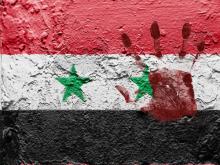
As the Obama administration readies for a probable military strike against Syria, Religion News Service asked a panel of theologians and policy experts whether the U.S. should intervene in Syria in light of the regime’s use of chemical weapons against civilians. Would the “Just War” doctrine justify U.S. military action, and what is America’s moral responsibility? Here are their responses, which have been edited for clarity.
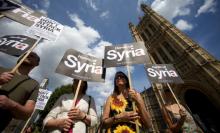
On Wednesday, President Barack Obama said that if Bashar al-Assad used chemical weapons against innocent civilians, there must be “international consequences.” The president is right. But what should those consequences be?
The issue here, again, is one that we have not decided how to deal with: terrorism. The definition of terrorism is deliberate and brutal attacks upon innocent people — whether by individuals, groups, or heads of state. By that definition, Assad is a terrorist. And terrorists who possess weapons of mass destruction and demonstrate their willingness to use them are most dangerous ones. But how should we respond?
I am in in the U.K., where political leaders last night backed off the decision to make immediate “military strikes” while the U.S. and other nations are considering them. The feeling here is that international and legal legitimacy need to be established first, that the U.N. inspectors should finish their examinations in Syria before any actions are taken, and that all other means of response should be fully explored first. These are good decisions.
Why is there such public “war fatigue” in the U.K. and the U.S. in light of Iraq and Afghanistan — and why is that creating reluctance to more military action? Because wars and military solutions have FAILED in response to terrorism — failed to achieve what they were purported to do.
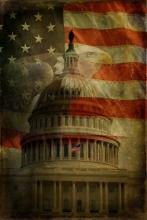
It is tragic to watch contemptuous right-wingers declaring war on America.
With little heed for consequences on either actual people or the national interest, they declare war on the poor, the hungry, Native Americans, the unemployed, gays and lesbians, immigrants, minority voters, women, military dependents, and public education.
The recent farm bill — which gives public subsidies to agribusiness and denies food stamps to the hungry — is just the latest sortie in a determined decades-long assault on American values.
THE FONDEST memories I have of Kathy Kelly are of her singing. It’s safe to say that her three nominations for the Nobel Peace Prize were not for her voice, which is sometimes sweet but often a touch out of key. At times I’ve imagined her feeling briefly self-conscious about this, but that passes. The song remains, and I am again reminded of just how deeply this woman can move me.
In spring 1999, in a small banquet room at Georgetown University, I first heard Kelly sing and speak about the suffering in Iraq. A crowd of about 200 people had gathered to hear about her work. She had been to Iraq dozens of times to put a human face on the conflict there and to defy the drastic financial and trade embargo that the U.N. Security Council had imposed shortly after Iraq’s 1990 invasion of Kuwait.
She briefly went over the statistics—the deep poverty, the lack of medicines, the estimated half-million children who had died, many due to the U.N. sanctions, enforced in part by a U.S.-led blockade—but she quickly moved on. Statistics weren’t her strength.
Instead she spoke from the heart. Kelly talked about the ordinary Iraqis she had met: the worn women who served her tea and biscuits they could barely afford, the countless kids in threadbare hand-me-downs who ran after her merrily in the street, the tired doctors who broke down crying as they remembered all the children they had lost, the stone-faced parents who accepted her condolences because they didn’t know what else to do.
She also told the story of Zayna, a 7-month-old baby girl who died of malnutrition shortly after Kelly visited her in the hospital.

Star Trek: Into Darkness is a fascinating and complicated story that is well worth watching. Instead of providing a summary, I want to explore three related aspects of the movie: sacrifice, blood, and hope for a more peaceful future.
Live Long and Prosper – The Sacrificial Formula
In a reference to my favorite Star Trek movie, Star Trek II: The Wrath of Khan, the current movie’s Spock (Zachary Quinto) restates the sacrificial formula: “The needs of the many outweigh the needs of the one.” This formula has generally been used throughout human history to justify sacrificing someone else. As René Girard points out, from ancient human groups to modern societies, whenever conflicts arise the natural way to find reconciliation is to unite against a common enemy.
Of course, there’s a lot of this going on throughout the Star Trek franchise. One conversation in Into Darkness explicitly points this out when Kirk (Chris Pine) unites with his enemy Khan (Benedict Cumberbatch), and explains it to Spock:
Kirk: The enemy of my enemy is my friend.
Spock: An Arabic proverb attributed to a prince who was betrayed and decapitated by his own subjects.
Kirk: Well, it’s still a hell of a quote.